Abstract
The in vitro activity of rifampin alone and in combination with oxacillin was determined for 75 Staphylococcus aureus strains (64 susceptible and 11 resistant to oxacillin). Minimal inhibitory concentrations (MICs) and minimal bactericidal concentrations (MBCs) were determined by broth microdilution; antibiotic combinations were evaluated by microdilution checkerboard and time-kill studies. The 90% MIC of rifampin was less than or equal to 0.015 micrograms/ml after both 24 and 48 h of incubation. The 90% MBC of rifampin was less than or equal to 2.0 micrograms/ml on subculture at 24 h of incubation and less than or equal to 0.5 micrograms/ml on subculture at 48 h. MIC checkerboards with oxacillin-susceptible strains revealed an additive or indifferent effect in 35 strains (55%) and antagonism in 29 strains (45%). MBC checkerboards performed by subculture at 24 h demonstrated antagonism for all but one of the oxacillin-susceptible strains, with sub-MBCs of rifampin impairing the bactericidal activity of oxacillin. MBC checkerboards performed by 48-h subculture revealed antagonism with 37 strains (58%); in 26 additional strains (40%), a synergistic, additive, or indifferent effect was observed at low antibiotic concentrations, but antagonism was seen at higher concentrations. Time-kill studies tended to show indifference rather than antagonism with oxacillin plus rifampin. In checkerboards performed with oxacillin-resistant strains, the addition of rifampin did not improve oxacillin inhibitory or bactericidal activity to a clinically significant extent; however, the addition of oxacillin improved the bactericidal activity of rifampin at easily achievable serum concentrations.
Full text
PDF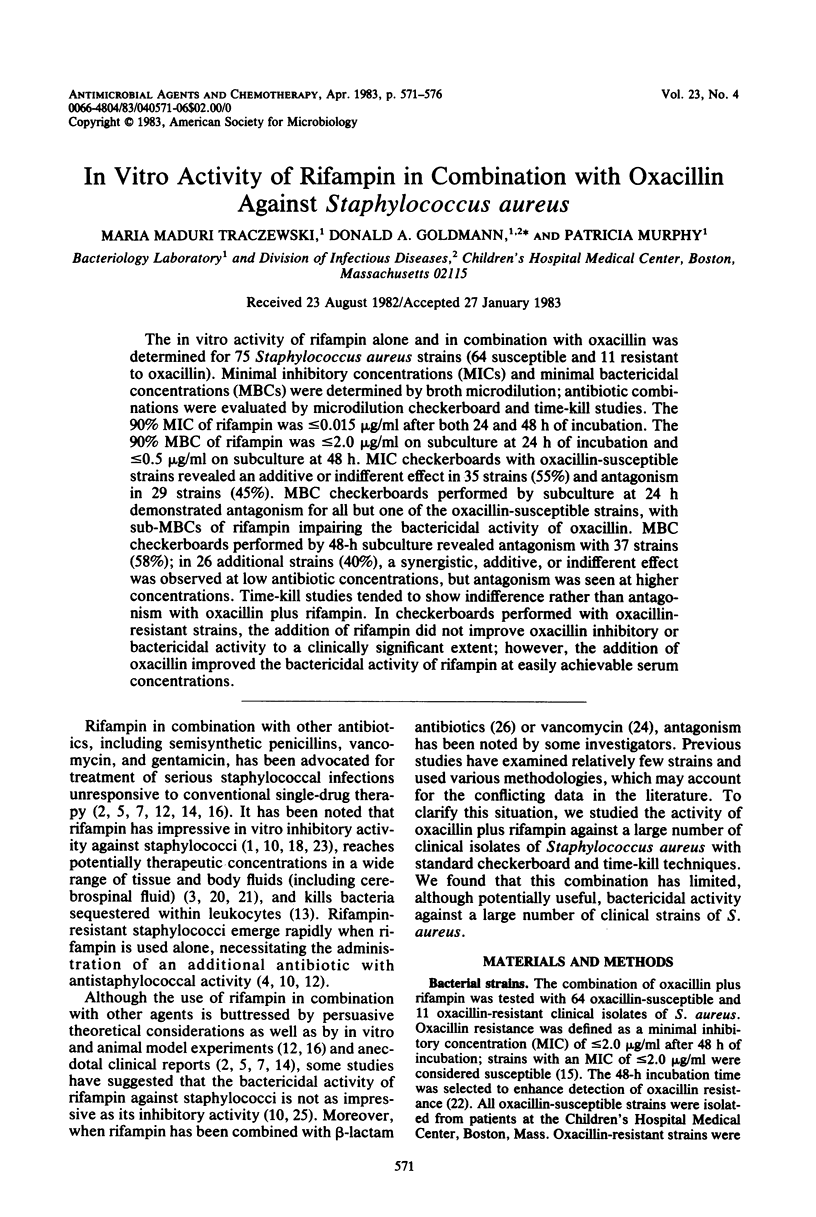
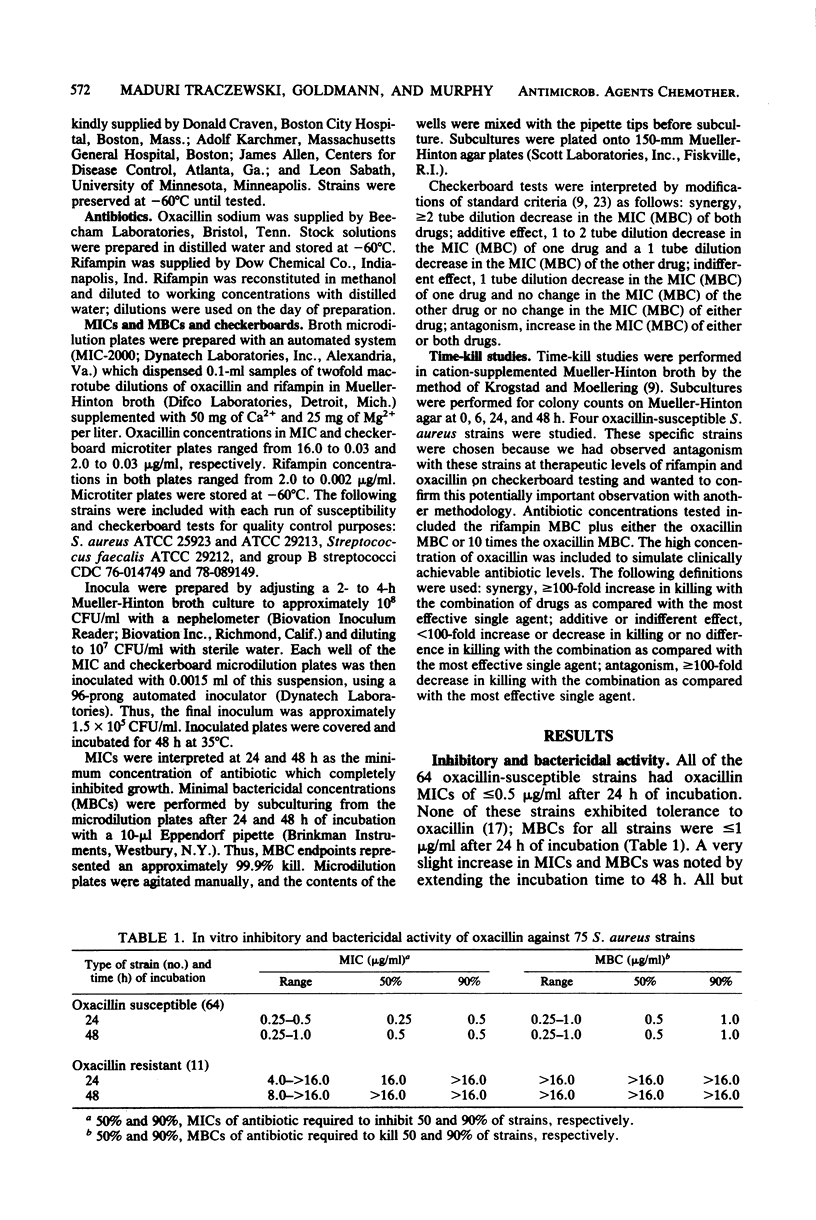
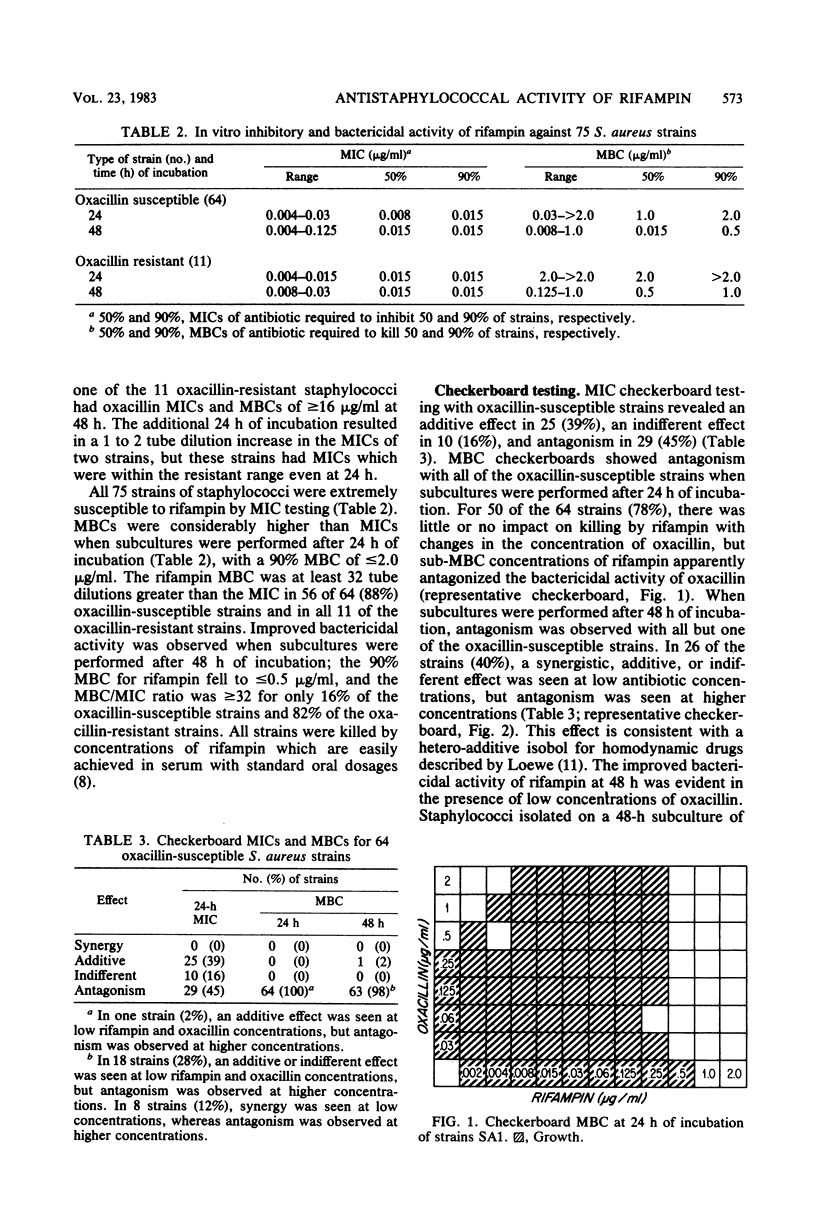
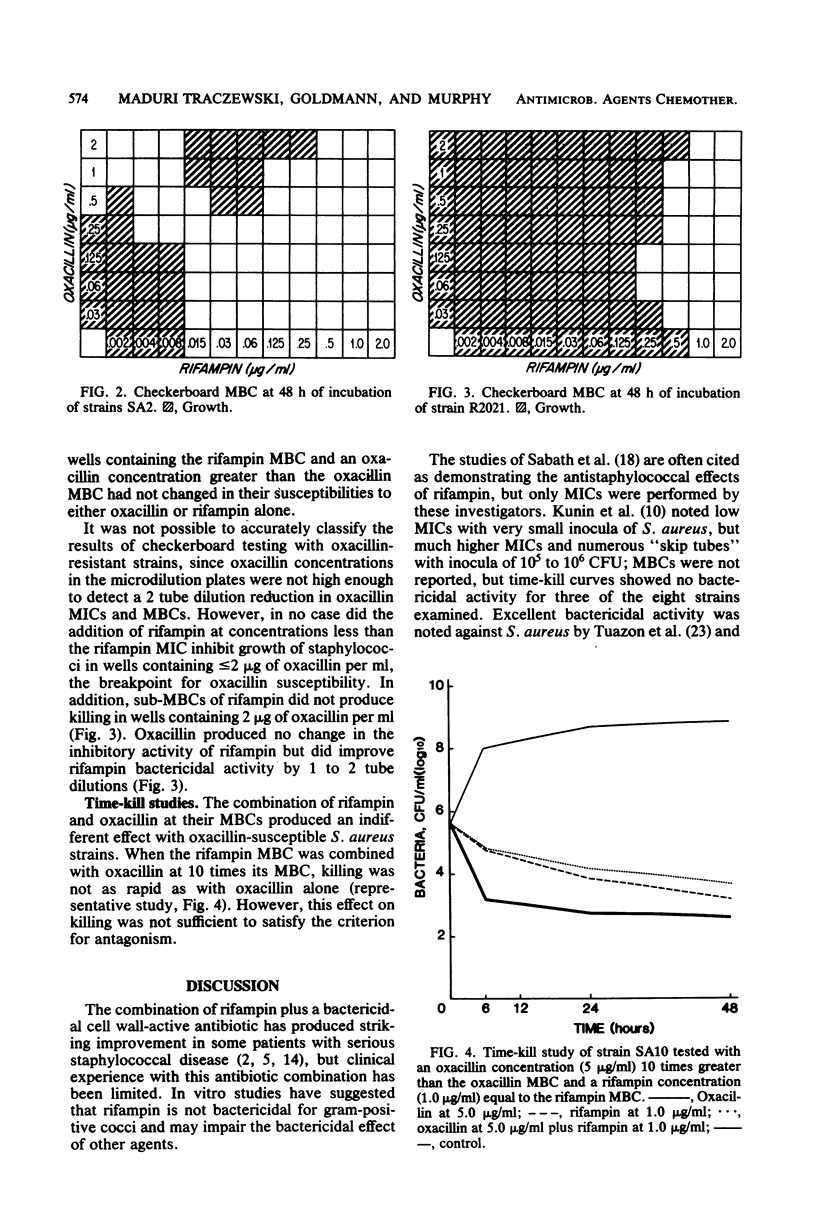
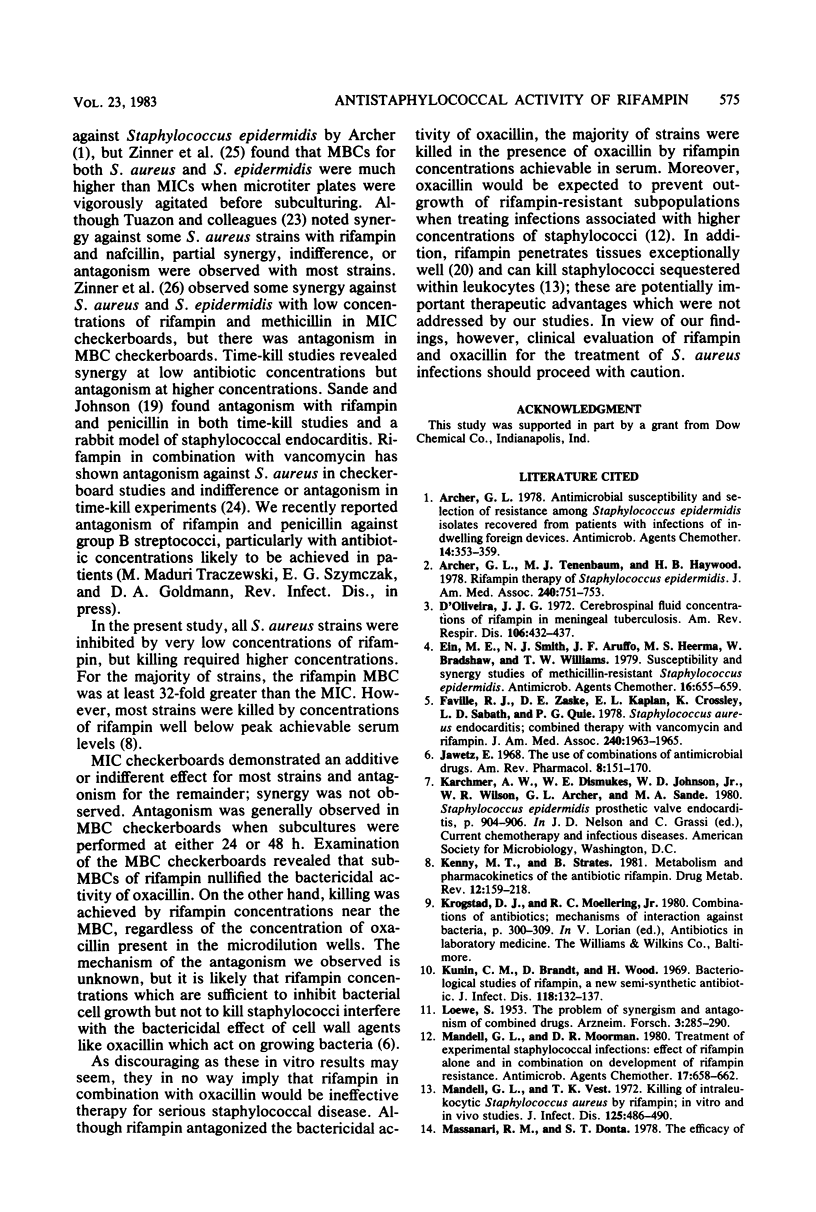
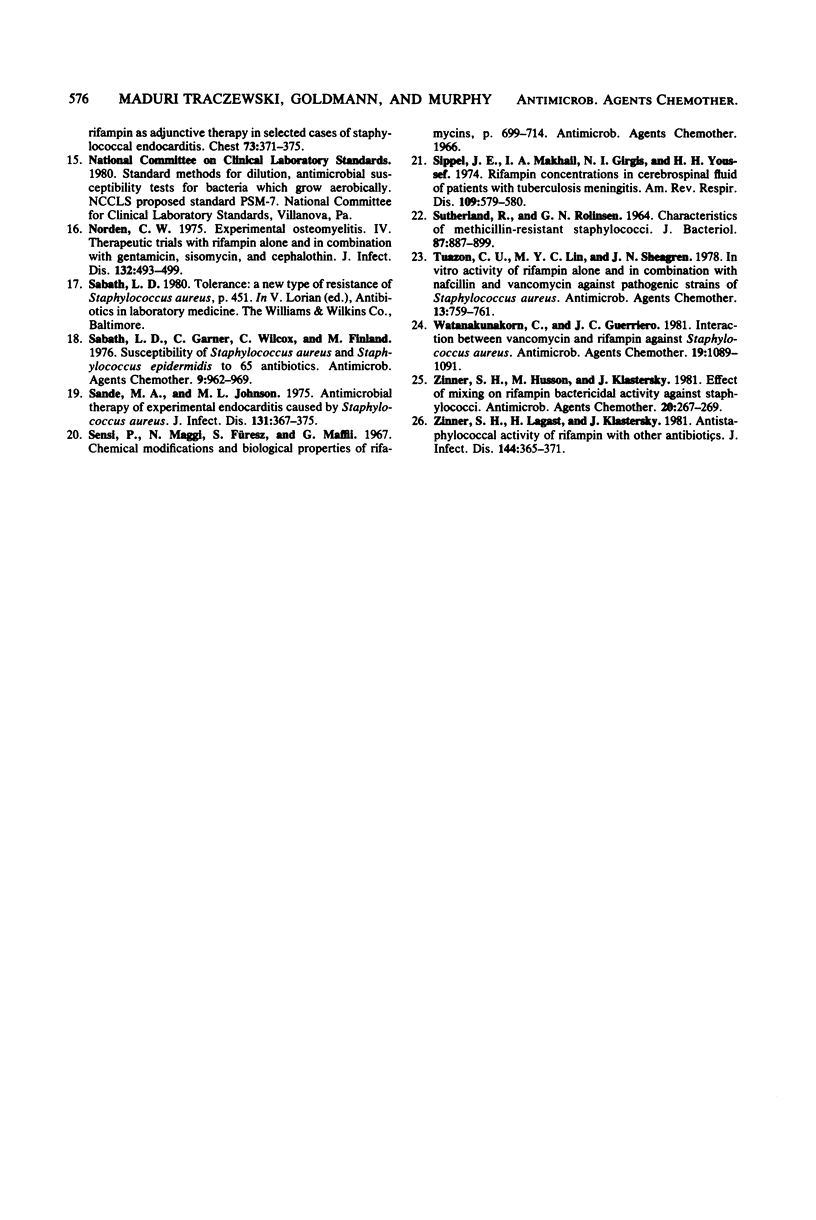
Selected References
These references are in PubMed. This may not be the complete list of references from this article.
- Archer G. L. Antimicrobial susceptibility and selection of resistance among Staphylococcus epidermidis isolates recovered from patients with infections of indwelling foreign devices. Antimicrob Agents Chemother. 1978 Sep;14(3):353–359. doi: 10.1128/aac.14.3.353. [DOI] [PMC free article] [PubMed] [Google Scholar]
- Archer G. L., Tenenbaum M. J., Haywood H. B., 3rd Rifampin therapy of Staphylococcus epidermidis. Use in infections from indwelling artificial devices. JAMA. 1978 Aug 25;240(8):751–753. [PubMed] [Google Scholar]
- D'Oliveira J. J. Cerebrospinal fluid concentrations of rifampin in meningeal tuberculosis. Am Rev Respir Dis. 1972 Sep;106(3):432–437. doi: 10.1164/arrd.1972.106.3.432. [DOI] [PubMed] [Google Scholar]
- Ein M. E., Smith N. J., Aruffo J. F., Heerema M. S., Bradshaw M. W., Williams T. W., Jr Susceptibility and synergy studies of methicillin-resistant Staphylococcus epidermidis. Antimicrob Agents Chemother. 1979 Nov;16(5):655–659. doi: 10.1128/aac.16.5.655. [DOI] [PMC free article] [PubMed] [Google Scholar]
- Faville R. J., Jr, Zaske D. E., Kaplan E. L., Crossley K., Sabath L. D., Quie P. G. Staphylococcus aureus endocarditis. Combined therapy with vancomycin and rifampin. JAMA. 1978 Oct 27;240(18):1963–1965. doi: 10.1001/jama.240.18.1963. [DOI] [PubMed] [Google Scholar]
- Jawetz E. The use of combinations of antimicrobial drugs. Annu Rev Pharmacol. 1968;8:151–170. doi: 10.1146/annurev.pa.08.040168.001055. [DOI] [PubMed] [Google Scholar]
- Kenny M. T., Strates B. Metabolism and pharmacokinetics of the antibiotic rifampin. Drug Metab Rev. 1981;12(1):159–218. doi: 10.3109/03602538109011084. [DOI] [PubMed] [Google Scholar]
- Kunin C. M., Brandt D., Wood H. Bacteriologic studies of rifampin, a new semisynthetic antibiotic. J Infect Dis. 1969 Feb;119(2):132–137. doi: 10.1093/infdis/119.2.132. [DOI] [PubMed] [Google Scholar]
- LOEWE S. The problem of synergism and antagonism of combined drugs. Arzneimittelforschung. 1953 Jun;3(6):285–290. [PubMed] [Google Scholar]
- Mandell G. L., Moorman D. R. Treatment of experimental staphylococcal infections: effect of rifampin alone and in combination on development of rifampin resistance. Antimicrob Agents Chemother. 1980 Apr;17(4):658–662. doi: 10.1128/aac.17.4.658. [DOI] [PMC free article] [PubMed] [Google Scholar]
- Mandell G. L., Vest T. K. Killing of intraleukocytic Staphylococcus aureus by rifampin: in-vitro and in-vivo studies. J Infect Dis. 1972 May;125(5):486–490. doi: 10.1093/infdis/125.5.486. [DOI] [PubMed] [Google Scholar]
- Norden C. W. Experimental osteomyelitis. IV. Therapeutic trials with rifampin alone and in combination with gentamicin, sisomicin, and cephalothin. J Infect Dis. 1975 Nov;132(5):493–499. doi: 10.1093/infdis/132.5.493. [DOI] [PubMed] [Google Scholar]
- SUTHERLAND R., ROLINSON G. N. CHARACTERISTICS OF METHICILLIN-RESISTANT STAPHYLOCOCCI. J Bacteriol. 1964 Apr;87:887–899. doi: 10.1128/jb.87.4.887-899.1964. [DOI] [PMC free article] [PubMed] [Google Scholar]
- Sabath L. D., Garner C., Wilcox C., Finland M. Susceptibility of Staphylococcus aureus and Staphylococcus epidermidis to 65 antibiotics. Antimicrob Agents Chemother. 1976 Jun;9(6):962–969. doi: 10.1128/aac.9.6.962. [DOI] [PMC free article] [PubMed] [Google Scholar]
- Sande M. A., Johnson M. L. Antimicrobial therapy of experimental endocarditis caused by Staphylococcus aureus. J Infect Dis. 1975 Apr;131(4):367–375. doi: 10.1093/infdis/131.4.367. [DOI] [PubMed] [Google Scholar]
- Sippel J. E., Mikhail I. A., Girgis N. I., Youssef H. H. Rifampin concentrations in cerebrospinal fluid of patients with tuberculous meningitis. Am Rev Respir Dis. 1974 May;109(5):579–580. doi: 10.1164/arrd.1974.109.5.579. [DOI] [PubMed] [Google Scholar]
- Tuazon C. U., Lin M. Y., Sheagren J. N. In vitro activity of rifampin alone and in combination with nafcillin and Vancomycin against pathogenic strains of Staphylococcus aureus. Antimicrob Agents Chemother. 1978 May;13(5):759–761. doi: 10.1128/aac.13.5.759. [DOI] [PMC free article] [PubMed] [Google Scholar]
- Watanakunakorn C., Guerriero J. C. Interaction between vancomycin and rifampin against Staphylococcus aureus. Antimicrob Agents Chemother. 1981 Jun;19(6):1089–1091. doi: 10.1128/aac.19.6.1089. [DOI] [PMC free article] [PubMed] [Google Scholar]
- Zinner S. H., Husson M., Klastersky J. Effect of mixing on rifampin bactericidal activity against staphylococci. Antimicrob Agents Chemother. 1981 Aug;20(2):267–269. doi: 10.1128/aac.20.2.267. [DOI] [PMC free article] [PubMed] [Google Scholar]
- Zinner S. H., Lagast H., Klastersky J. Antistaphylococcal activity of rifampin with other antibiotics. J Infect Dis. 1981 Oct;144(4):365–371. doi: 10.1093/infdis/144.4.365. [DOI] [PubMed] [Google Scholar]



